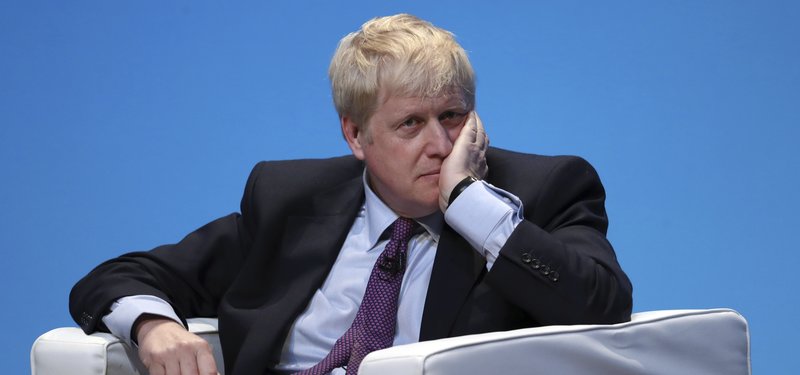
UK's Johnson asks for a Brexit delay that he doesn't want
Prime Minister Boris Johnson has sent an unsigned letter to the European Union requesting a delay to Britain's exit from the bloc, as well as a second note saying he did not want a "deeply corrosive" Brexit extension. Johnson was required by law to send the first letter, after parliament voted on Saturday to withhold its approval of his Brexit deal until it has passed legislation to formally ratify the agreement.
- World
- AP
- Published Date: 04:17 | 20 October 2019
- Modified Date: 04:17 | 20 October 2019
British Prime Minister Boris Johnson pressed ahead Sunday with plans to try to win parliamentary backing for his new Brexit deal even as the European Union began considering his grudging request to extend the looming Brexit deadline.
Johnson sent an unsigned letter to the EU late Saturday seeking a delay to Britain's impending Oct. 31 departure from the bloc, as required by law. But he followed it with a signed letter indicating that he does not favor another Brexit extension.
"My view, and the government's position, (is) that a further extension would damage the interests of the U.K. and our EU partners, and the relationship between us," Johnson wrote to European Council President Donald Tusk.
Johnson has long declared that he plans to take the U.K. out of the EU on Oct. 31 come what may, and his minister in charge of Brexit again emphasized that stance.
"We are going to leave by Oct. 31st," Michael Gove told Sky News on Sunday. "We have the means and the ability to do so."
The EU's chief Brexit negotiator, Michel Barnier, said Tusk would consult with other leaders "in the next days."
Barnier met briefly Sunday with EU ambassadors to take stock of the drawn-out Brexit process, but they did not discuss Johnson's request, according to three diplomats who discussed the behind-closed-doors meeting on condition of anonymity.
Germany's Economy Minister Peter Altmaier, a member of Chancellor Angela Merkel's party, told Bild newspaper that, "if an extension by a few weeks is necessary, I wouldn't have a problem with it."
The formal granting or denial of an extension by the bloc may not be made until the Brexit deadline is just days away, but most signs indicate the EU would prefer an extension to an abrupt U.K. departure from the bloc without a deal in place.
British Foreign Secretary Dominic Raab said he believes Johnson has enough support to get his deal through Parliament, but added the government would keep talking with its Northern Ireland ally, the Democratic Unionist Party, to persuade it to back the deal. So far, the party, which holds 10 seats in Parliament, has refused to support Johnson's deal because it treats Northern Ireland differently than other parts of the U.K.
"We'll keep talking to the DUP and see if there's any further reassurances that can be provided," Raab told the BBC's Andrew Marr Show.
Johnson's Conservative party has only 288 seats in the 650-seat House of Commons, so he needs the support of some opposition lawmakers.
Johnson's letters came after another tumultuous day in the House of Commons, which worked in a Saturday session for only the first time since the Falklands War in 1982. For hours, British lawmakers issued both ringing endorsements and scathing condemnations of Johnson's Brexit deal, only to kick any decision on it down the road by passing an amendment withholding approval for the deal until laws enabling it are passed. That could take days, or even weeks.
While Johnson insists on sticking to the Oct. 31 Brexit deadline, lawmakers are trying to avoid a no-deal Brexit, which economists say would wreak damage on the U.K. economy.
Johnson now could face legal challenges from opponents who feel that sending the second letter was done specifically to frustrate the will of Parliament.
The Court of Session in Scotland is already considering the matter, and it may end up being decided in the British Supreme Court, which in September ruled that Johnson had acted unlawfully when he suspended Parliament for five weeks as the Brexit deadline crept closer.
Scottish National Party legislator Joanna Cherry, part of a group that brought the earlier successful case against Johnson, said the legal battle over Brexit resumes Monday.
"We're back in court on Monday morning and it will be possible then to secure the court's assistance if the prime minister has flouted the law and the promises he gave to the court," she said.
Despite the stinging rebuke in Parliament on Saturday, the prime minister returns there Monday to keep drumming up support for his Brexit proposal, which was approved Thursday by EU leaders. He is still trying to meet the Oct. 31 Brexit deadline but the timing is extremely tight.
In London on Saturday, hundreds of thousands of anti-Brexit demonstrators marched to Parliament Square, demanding a new referendum on whether Britain should leave the EU or remain. Many wore blue berets emblazoned with yellow stars symbolizing the EU flag.
"Another chance for sanity and perhaps rationality to take over, rather than emotion," filmmaker Jove Lorenty said as he stood outside Parliament. "Never give up until the fat lady sings. No one knows what will happen, but we have hope."

